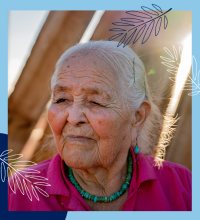Reducing health disparities: Alzheimer’s disease in communities of color
01/04/2024
Thanks to a recent philanthropic investment, the Banner Alzheimer’s Institute is expanding dementia care, caregiver support, and community outreach to diverse Arizonans. The funding will support the Institute’s existing Native American Outreach Program as well as new initiatives and partnerships designed to better reach and support Black and Latino patients and care partners. The goal of these programs is to raise awareness of risk factors, symptoms, available care, and research opportunities in ways that are culturally sensitive. This program is supported by a grant from the May & Stanley Smith Charitable Trust.
Research shows that dementia disproportionately impacts people of color. According to a 2021 publication from the American Alzheimer’s Association, Black Americans are twice as likely, and Latino Americans are 1.5 times as likely, to have Alzheimer’s or other dementias than their Caucasian counterparts. Statistics show that Black, Latino and Native American populations are less likely to be diagnosed than Caucasians and are twice as likely to say they would not see a doctor if experiencing thinking or memory problems. These factors create disparities in care that lead to poorer health outcomes for people of color—an issue the Banner Alzheimer’s Institute has been working to address for over a decade.
Launched in 2003, the Banner Alzheimer’s Institute’s Native American Outreach program’s mission is to foster awareness, care and scientific understanding of Alzheimer’s disease and dementia-related diseases in Native American communities through education and outreach. The Institute works with Arizona’s 22 Tribal communities, reaching elders living with dementia, family and professional caregivers, health care providers and community members. Services include online training, educational materials delivered to Tribal community senior centers, and meal pick-up and delivery programs.
An annual conference offers information-rich sessions led by experienced speakers that discuss the different models of caregiving, recent Alzheimer’s research findings and services and support to help caregivers and Tribal families affected with Alzheimer’s.
Because many Tribal elders lack internet and/or technology access, the monthly Native American Circle Group formed during the pandemic and continues to offer phone support to discuss care strategies and wellness resources for caregivers. Because many family members caring for a loved one with Alzheimer’s disease or another form of dementia experience isolation and may lack access to critical senior activity, support, and respite programs, the Institute continues to expand community partnerships with the Inter-Tribal Council of Arizona, International Association for Indigenous Living, Sunshine Music Therapy for neurodegeneration, and Tribal music production company Canyon Records.
“Through culturally sensitive education, training, and outreach services, our program has already reached thousands of vulnerable people who are in need of critical resources,” explains Banner Alzheimer’s Institute Family and Community Services Director Lori Nisson, MSW, LCSW.
Now, thanks to this generous support from the Smith Charitable Trust, similar offerings designed to address the unique needs of Black and Latino patients and caregivers will be available. Due to the stigma of Alzheimer’s disease and related dementias, most patients and caregivers find themselves isolated from friends, family, and their community. The Banner Alzheimer’s Institute has formed meaningful new partnerships with Chicanos Por La Causa and FIBCO (Facilitating Independence Building Comprehensive Opportunities) Family Services, Inc. to collaborate on education and support programming, access to care, and opportunities for clinical research study participation.
“We saw a critical need to elevate resources to prioritize improving care and research opportunities for diverse and marginalized communities to ensure that underserved people have equitable and culturally relevant medical care as well as education and resources to support their comprehensive needs,” says Nisson, “along with opportunities for their culture to be represented in research studies to allow for a shared voice and expanded representation.”
